
Background information
The Fitbit fib – fitness trackers aren’t telling the whole truth
by Claudio Viecelli

The nematode, Caenorhabditis elegans, is 60 percent genetically identical to humans and undergoes a similar aging process as we do. And it does so in just three weeks. This makes it highly interesting for research.
We are all getting older - and with each additional year of life, the risk of the onset of an age-related disease such as cancer, diabetes or Alzheimer's increases. Can this process be slowed down or even stopped? This question is being investigated by a group of researchers at ETH Zurich led by molecular biologist Prof. Dr. Collin Ewald. The nematode Caenorhabditis elegans plays a central role.
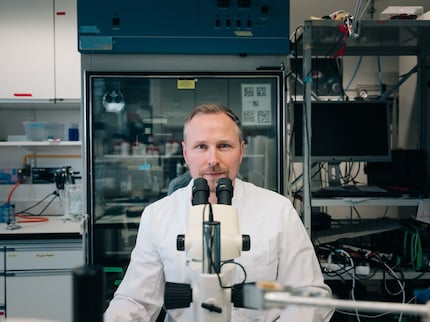
The wrinkles on our faces are getting deeper, our bones more rotten: we are aging. But why? Can we actively delay our biological aging? And if so, how?
The primary goal of an organism is to reproduce. This means the fastest possible development with the highest possible reproduction rate. In principle, evolution does not care what happens to the organism afterwards. Accordingly, the organism begins to decay slowly according to a kind of random principle, since from an evolutionary point of view there is no reason to maintain it. A term from mathematics describes this process: stochastic.
Collin Ewald, can you please explain this in more detail?
Collin: When an organism grows and reproduces rapidly, genes that promote growth are favored. This is good during the developmental phase. However, bad when this developmental process is complete. Because the same genes that are good for rapid growth can have negative effects after reproduction. Then the system slowly collapses, so to speak. However, this does not happen according to a clear pattern, but randomly. We then speak of stochastics or the mathematics of chance. It is about calculating probabilities. You may remember this from math lessons, where it is often about dice games or the drawing of lottery numbers.
So, if I have reproduced, my biological mission is fulfilled and I can go? And depending on this, do I just happen to live a little longer than others or not?
In principle, yes, but the whole aging process is of course more complex. When a cell divides, for example, the mother cell retains all defects such as damaged proteins or DNA, while the new daughter cell enters life healthy and without molecular damage, so to speak. This damage in the mother cells accumulates over time until the system eventually fails.
And if the cell does not divide, what happens?
Then it invests its energy in repairing the existing damage instead of reproducing.
So either growth, i.e. reproduction, and the associated progressive aging process, or the cell does not divide and lives longer instead?
Simultaneous growth and repair is not possible. It is a question of resources. If there are enough, the cell divides, if not, it repairs.
That's almost a plea for fasting.
Good point. Let's take Japan as an example. Some of the oldest people in the world live there. Why? Many Japanese practice what is known as "Hara Hachi Bu. This means that they only fill their stomachs 80 percent at a time during a meal. So they never overeat. This could be one of the explanations for this phenomenon. There are others, such as people's exercise behavior or genetics. In this context, it is interesting to note that the influence of genes on the aging process is around 20 percent. The rest are environmental influences. So we can have a strong influence on it through our behavior.
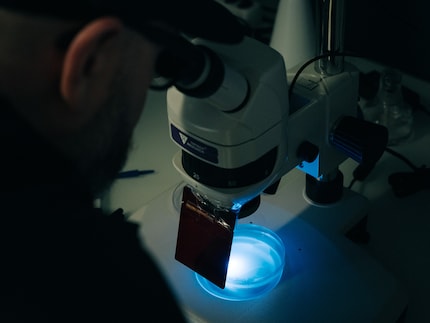
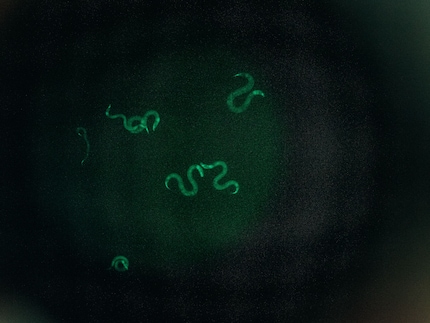
Let's stay with genetics. Nematodes are genetically about 60 percent identical to us humans. I assume that's what makes them so relevant to your research?
Yes, but not only that. Nematodes, Caenorhabditis elegans, go through a very similar aging process to us. And they do it in about three weeks. Moreover, all worms are genetically identical. They are twins. So, on the one hand, we can collect a lot of data on this process in a very short time. On the other hand, we can see quite quickly how certain interventions affect the aging process of the nematodes. If we were to study this in mice, everything would take much longer. In fact, in mice, the aging process takes about three years.
What would be such an intervention?
For example, the fasting you mentioned. Do worms live longer when we reduce food? Which genes play a role in this context and what happens if we "switch off" these genes? Does the worm then actually live longer? Our findings can then be transferred quite well to humans.
And, does the worm then actually live longer?
For example, we have succeeded in doubling the lifespan of certain threadworms from three to six weeks.
Okay, a quick extrapolation - I double my average life expectancy and take 60 percent of that - would give me about 97 years as a man in Switzerland instead of the current 81. For a woman, life expectancy would increase from the current 85 years to around 102 years. Agreed?
(Laughs) It's not quite that simple. It can't simply be extrapolated to humans, because only about 20 percent of the aging process is based on our genetics.
During his time as a doctoral student, Collin Ewald spent days in the lab observing nematodes through the microscope. Thousands and thousands. Three weeks or six, depending on how long a worm's life lasted. Eight hours a day. And noted by hand the changes that the worms showed as a result of an intervention. For example, genes associated with long life were identified in people over 100 years old. These genes were then activated or deactivated in the nematodes. Thus, their lifespan lengthened or shortened.
That's the past. In the present, the worms are scanned. Once every hour, for 24 hours, seven days a week. These are commercial scanners that have been converted. Each scanner has 16 plates, and there are between 70 and 100 worms on each plate. Ten scanners are in use. A maximum of 16,000 worms are scanned every hour. Thus, a flood of data is generated in a very short time.
Nicholas Stroustrup, a biologist at Harvard University in Boston, came up with the idea of the scanners. He tinkered with commercially available scanners for ten years until the system was usable. Collin Ewald also spent some time at the elite American university. After he got the okay from Stroustrup, he set up the system here in Switzerland. However, it took another year and a half before everything worked perfectly.
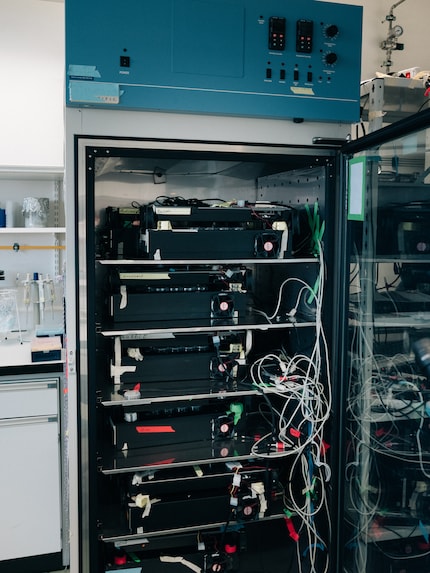
Collin, you've been researching nematodes for 17 years. But the origins of this research go back further.
They go back to the 1960s. A milestone was in 1993, when molecular biologist Cynthia Kenyon succeeded in demonstrating that a single gene mutation could double the life of a healthy, fertile nematode. This finding had a fascinating effect on me. The aging process is so complex, subject to so many influences. How was it possible that it was enough to change one DNA building block to double the lifespan?
And where are we today? When will the pill be available that will allow me to live to 120 years in good health?
We have made enormous progress in basic research in the last ten years. Many mechanisms of the aging process are known, and active substances have been identified that have prolonged the lives of nematodes and also of mice. What must now follow are clinical studies in humans. The problem: aging is not (yet) defined as a disease, although this process affects us all. So how can we conduct clinical trials for something that doesn't even exist in that sense?
By defining aging as a disease?
If that is the case, the first human clinical trials will occur. We expect that to be the case in five to ten years. But as I said, there are already active substances today that are said to have a life-prolonging effect. Metformin, for example, is one such agent. It is mainly used in the treatment of type 2 diabetes mellitus. Studies have shown that diabetics who take this drug have a longer life expectancy than non-diabetics who logically do not take it. It has also been shown that people taking metformin are less likely to develop cancer or Alzheimer's disease. The next step would be to test this drug in healthy people.
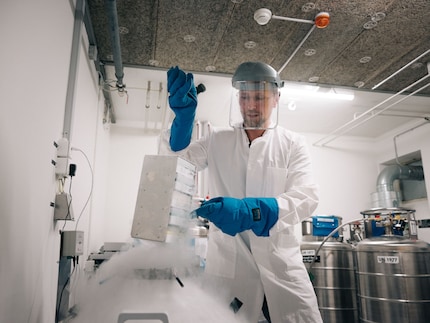
Let's talk about the relationship between genetics and environmental influences. You said that around 20 percent of the aging process is influenced by genes. I would have guessed significantly more here. So my lifestyle has an enormous influence on how old I get.
We assume that stress in small doses is good for your body. That's where the rule of thumb comes from: a glass of wine a day and you'll live longer. The alcohol in wine is a stressor that your body adapts to. This has a positive effect. However, if the amount gets too high, the opposite happens. This then affects your epigenetics. It is, so to speak, the link between environmental influences and genes. So diet, exercise behavior, pollution, etc. all play an important role.
I used to not pay much attention to my body. For example, I was a smoker for many years. In my mid-40s, I gave up the cigarettes and started to exercise. Today I lead an active lifestyle, eat healthily and only drink alcohol in moderation. So what does that mean in terms of my epigenetics?
That you probably aged faster during your time as a smoker. You were probably biologically a few years older at 45 chronologically. Maybe already over 50, but through your interventions you probably got some of those years back. One can investigate this, by the way. There are companies that specialize in determining biological age.
You are a molecular biologist. Are you also concerned with the possible social implications of your research?
That's why I'm doing research in this direction. We are getting older and older, and as we get older, the number of diseases such as cancer and Alzheimer's increases. On the one hand, this is an enormous financial burden for the younger generation. Especially the last year of a person's life is very cost-intensive. On the other hand, we have to rethink our view of old age in general. My mother, for example, started studying psychology after she retired, and my father went into politics. In the past, the average life expectancy in Switzerland was 66 years. That's why people retired at 65. Today, we have 15 to 20 years left after retirement. But in order to maintain an active lifestyle in old age, you have to be as healthy as possible.
So your research is not primarily about adding as many years to your life as possible, but about being as healthy as possible?
Exactly, it's primarily about quality, not quantity. The goal is to grow old as healthily as possible.
Ethical questions also arise. Should we intervene in a natural process at all?
Why not? We want to age healthily. We don't want to artificially extend our lives by years. We want quality of life in old age. That's why we do research.
What may sound like science fiction today will be reality in a few years, according to Collin Ewald. A whole range of supplements with active ingredients that keep us healthy. There are already a number of start-ups in the wings here that have secured patents on these active ingredients. It smells like big business. In five to ten years, the first results of clinical trials should be available and the corresponding drugs will then be launched on the market. From supplement to drug. But it won't be small start-ups that will have their fingers in the pie, it will be Big Pharma that sets the pace. It smells like BIG Business when aging is a disease.
This is what the near future looks like. Then what? The next step is the reset button: Reset Age. This "Reversal of Aging" is already working in single cells. Here, too, Harvard University is at the forefront of research. First and foremost, David A. Sinclair. The biologist recently published an interesting book on the subject. Under the title "The End of Aging," the professor propagates the revolutionary medicine of tomorrow. Or rather from the day after tomorrow at the earliest, because according to Collin Ewald, this reprogramming is possible, but the technology is still in its infancy.
But no matter what science may bring us in the future. Even in the present, it is clear that we often pay too little attention to our bodies. A healthy diet, more exercise, less stress and an intact environment already have a life-prolonging effect. We have Caenorhabditis elegans, among others, to thank for this insight.

From radio journalist to product tester and storyteller, jogger to gravel bike novice and fitness enthusiast with barbells and dumbbells. I'm excited to see where the journey'll take me next.
Interesting facts about products, behind-the-scenes looks at manufacturers and deep-dives on interesting people.
Show all